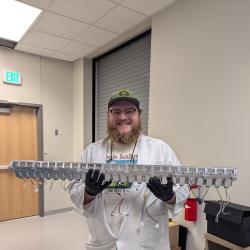Physics' Alessandra Buonanno Elected to National Academy of Sciences
Alessandra Buonanno has been elected to the National Academy of Sciences (NAS).
Buonanno is the director of the Astrophysical and Cosmological Relativity Department at the Max Planck Institute for Gravitational Physics in Potsdam and a Research Professor at the University of Maryland. She joined the UMD Department of Physics in 2005, and received an Alfred P. Sloan Foundation Fellowship and the Richard A. Ferrell Distinguished Faculty Fellowship. She is a Fellow of the American Physical Society and the International Society of General Relativity and Gravitation. In 2018, she received the Leibniz Prize, Germany's prestigious research award. Earlier in 2021, she was awarded the Galileo Galilei Medal of the National Institute for Nuclear Physics (INFN).
The new class brings the total number of active members to 2,461 and the total number of international members to 511. Other UMD physics members of the NAS include Michael Fisher, Jim Gates, Chris Jarzynski, John Mather, Chris Monroe, Bill Phillips, Roald Sagdeev, Rob Tycko, John Weeks and Ellen Williams.
Buonanno was also recently elected to the German National Academy of Sciences Leopoldina, which originated in 1652 as a classical scholarly society.
Buonanno's research has spanned several topics in gravitational-wave theory, data-analysis and cosmology. She is a Principal Investigator of the LIGO Scientific Collaboration, and her waveform modeling of cosmological events has been crucial in the experiment’s many successes.
Buonanno, Charlie Misner, Peter Shawhan and others detailed UMD's contributions to gravitational studies in a 2016 forum, A Celebration of Gravitational Waves.







